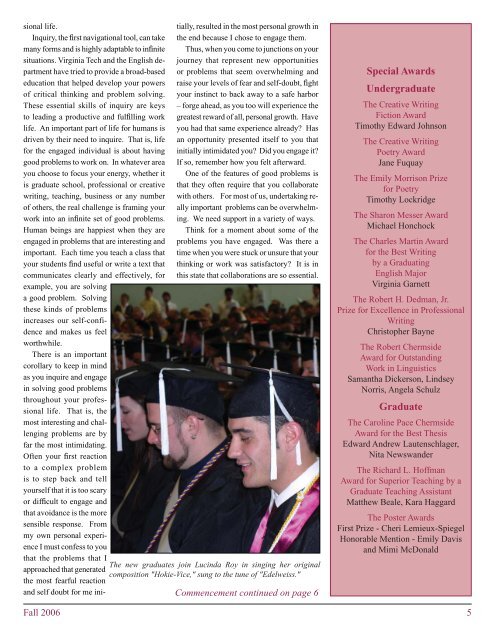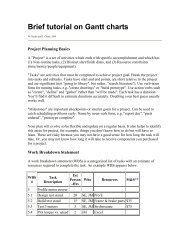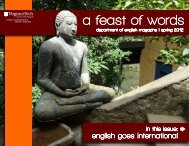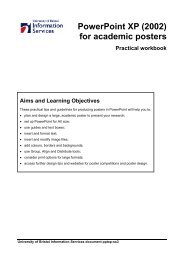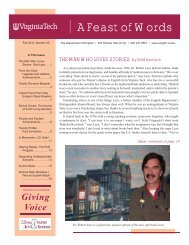A Feast of Words - Fall 2006 - Department of English - Virginia Tech
A Feast of Words - Fall 2006 - Department of English - Virginia Tech
A Feast of Words - Fall 2006 - Department of English - Virginia Tech
You also want an ePaper? Increase the reach of your titles
YUMPU automatically turns print PDFs into web optimized ePapers that Google loves.
sional life.<br />
Inquiry, the first navigational tool, can take<br />
many forms and is highly adaptable to infinite<br />
situations. <strong>Virginia</strong> <strong>Tech</strong> and the <strong>English</strong> department<br />
have tried to provide a broad-based<br />
education that helped develop your powers<br />
<strong>of</strong> critical thinking and problem solving.<br />
These essential skills <strong>of</strong> inquiry are keys<br />
to leading a productive and fulfilling work<br />
life. An important part <strong>of</strong> life for humans is<br />
driven by their need to inquire. That is, life<br />
for the engaged individual is about having<br />
good problems to work on. In whatever area<br />
you choose to focus your energy, whether it<br />
is graduate school, pr<strong>of</strong>essional or creative<br />
writing, teaching, business or any number<br />
<strong>of</strong> others, the real challenge is framing your<br />
work into an infinite set <strong>of</strong> good problems.<br />
Human beings are happiest when they are<br />
engaged in problems that are interesting and<br />
important. Each time you teach a class that<br />
your students find useful or write a text that<br />
communicates clearly and effectively, for<br />
example, you are solving<br />
a good problem. Solving<br />
these kinds <strong>of</strong> problems<br />
increases our self-confidence<br />
and makes us feel<br />
worthwhile.<br />
There is an important<br />
corollary to keep in mind<br />
as you inquire and engage<br />
in solving good problems<br />
throughout your pr<strong>of</strong>essional<br />
life. That is, the<br />
most interesting and challenging<br />
problems are by<br />
far the most intimidating.<br />
Often your first reaction<br />
to a complex problem<br />
is to step back and tell<br />
yourself that it is too scary<br />
or difficult to engage and<br />
that avoidance is the more<br />
sensible response. From<br />
my own personal experience<br />
I must confess to you<br />
that the problems that I<br />
approached that generated<br />
the most fearful reaction<br />
and self doubt for me initially,<br />
resulted in the most personal growth in<br />
the end because I chose to engage them.<br />
Thus, when you come to junctions on your<br />
journey that represent new opportunities<br />
or problems that seem overwhelming and<br />
raise your levels <strong>of</strong> fear and self-doubt, fight<br />
your instinct to back away to a safe harbor<br />
– forge ahead, as you too will experience the<br />
greatest reward <strong>of</strong> all, personal growth. Have<br />
you had that same experience already? Has<br />
an opportunity presented itself to you that<br />
initially intimidated you? Did you engage it?<br />
If so, remember how you felt afterward.<br />
One <strong>of</strong> the features <strong>of</strong> good problems is<br />
that they <strong>of</strong>ten require that you collaborate<br />
with others. For most <strong>of</strong> us, undertaking really<br />
important problems can be overwhelming.<br />
We need support in a variety <strong>of</strong> ways.<br />
Think for a moment about some <strong>of</strong> the<br />
problems you have engaged. Was there a<br />
time when you were stuck or unsure that your<br />
thinking or work was satisfactory? It is in<br />
this state that collaborations are so essential.<br />
The new graduates join Lucinda Roy in singing her original<br />
composition "Hokie-Vice," sung to the tune <strong>of</strong> "Edelweiss."<br />
Commencement continued on page 6<br />
Special Awards<br />
Undergraduate<br />
The Creative Writing<br />
Fiction Award<br />
Timothy Edward Johnson<br />
The Creative Writing<br />
Poetry Award<br />
Jane Fuquay<br />
The Emily Morrison Prize<br />
for Poetry<br />
Timothy Lockridge<br />
The Sharon Messer Award<br />
Michael Honchock<br />
The Charles Martin Award<br />
for the Best Writing<br />
by a Graduating<br />
<strong>English</strong> Major<br />
<strong>Virginia</strong> Garnett<br />
The Robert H. Dedman, Jr.<br />
Prize for Excellence in Pr<strong>of</strong>essional<br />
Writing<br />
Christopher Bayne<br />
The Robert Chermside<br />
Award for Outstanding<br />
Work in Linguistics<br />
Samantha Dickerson, Lindsey<br />
Norris, Angela Schulz<br />
Graduate<br />
The Caroline Pace Chermside<br />
Award for the Best Thesis<br />
Edward Andrew Lautenschlager,<br />
Nita Newswander<br />
The Richard L. H<strong>of</strong>fman<br />
Award for Superior Teaching by a<br />
Graduate Teaching Assistant<br />
Matthew Beale, Kara Haggard<br />
The Poster Awards<br />
First Prize - Cheri Lemieux-Spiegel<br />
Honorable Mention - Emily Davis<br />
and Mimi McDonald<br />
<strong>Fall</strong> <strong>2006</strong> 5


